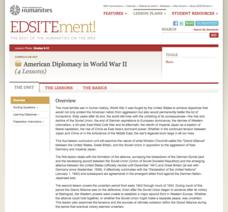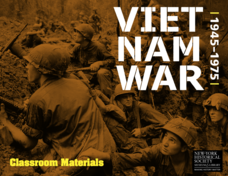Carolina K-12
What Should President Truman Do?
After reading the article Choices: Truman, Hirohito, and the Atomic Bomb, class members engage in a simulation, assume the role of President Truman or one of his advisors and discuss the options open to the president. The exercise...
National Endowment for the Humanities
American Diplocmacy in World War II
The end of World War II saw the world deeply changed over the last few years. Four thorough lessons explore post-war Europe, America, and Asia through reading assignments and discussion questions about the Grand Alliance and the signing...
University of California
Roots of the Cold War
When and how did the Cold War begin? To answer this question, you will not find a better-organized, in-depth, activity- and inquiry-based resource than this! Executing best teaching practices throughout, each portion of this inquiry...
New York Historical Society
The Vietnam War: 1945-1975
Do pupils know that the Vietnam War spanned a period of 30 years? A war that long is bound to leave devastating effects. Help young historians develop a comprehensive understanding of the war through multiple units on the subject that...
Teach It History
Crisis in Berlin: Decisions Game!
The Cold War did not begin with a bang, but with a swift tactic that reflected the Soviet Union's growing distrust of its former Allies. High schoolers choose either the USA or the USSR in a role play activity as they analyze why each...
Center for Civic Education
Historical Analysis of Constitutional Amendments
Each of the 27 Amendments to the U.S. Constitution were adopted within specific economic, political, social or cultural, and international contexts. As part of their Constitution Day/Week studies, seniors investigate these factors for...
Center for Civic Education
Matching Game with the US Constitution
In September we celebrate Constitution Day. Begin the celebration with a grand conversation about the US Constitution. Follow up the in-depth discussion with a learning game in which scholars match terms to images such as the...
What So Proudly We Hail
The Meaning of America: Enterprise and Commerce
Using Mark Twain's The Man That Corrupted Hadleyburg, invite your learners to consider the concept of virtue in a democratic society devoted to gain and self-interest. This stellar resource guides your class members through a close...
What So Proudly We Hail
The Meaning of America: Freedom and Individuality
What are the strengths and weaknesses of American individualism and independence? Explore these principles through a close reading of Jack London's To Build a Fire, and engage in high-level discussion with your class by analyzing the...
Bill of Rights Institute
Freedom for All?
What did abolitionists have in common with those working for women's rights? How has the Native American struggle for voting rights differed from the struggles of other groups? Class members examine the 15th, 19th, 23rd, 24th, and 26th...
Center for Civic Education
Constitution Day Rap
Engage your class while learning about the US Constitution with this fun primary grade social studies lesson. After viewing a picture of the US Constitution, young learners piece together a US flag using stars and stripes with facts...
Center for Civic Education
What Basic Ideas Are in the Preamble to the Constitution?
Introduce young historians to the US Constitution with this upper-elementary social studies lesson plan. Beginning with a general discussion about the role of government in society, students go on to work in small groups identifying and...
Center for Civic Education
What Is Authority?
Young scholars examine the concepts of power and authority as they begin learning about government in this elementary social studies lesson. Through a series of readings, discussions, and problem solving activities, children learn about...
Center for Civic Education
What Basic Ideas About Government Are Included in the Preamble to the Constitution?
Young historians explore the meaning of the Preamble to the US Constitution in this upper-elementary social studies lesson. Working with partners or in small groups, children discuss the purpose of government before reading and analyzing...
What So Proudly We Hail
The Meaning of America: National Identity and Why It Matters
Combining a close reading of a classic American text with the study of history can be a very powerful strategy, and this is most certainly the case with this resource using Edward Everett Hale's The Man without a Country. Consider themes...
Curated OER
What is Meant by Returning to Fundamental Principles?
What did the Founding Fathers mean by the importance of continually returning to fundamental principles? Your young historians will analyze a series of quotations illustrating the fundamental ideals and principles of the United States...
National Endowment for the Humanities
Sources of Discord, 1945-1946
From Allies to enemies within a year. Scholars research the falling out between the United States and the Soviet Union from 1945-1946 in the first lesson of a three-part series. Using primary source materials, group work, and interactive...


















